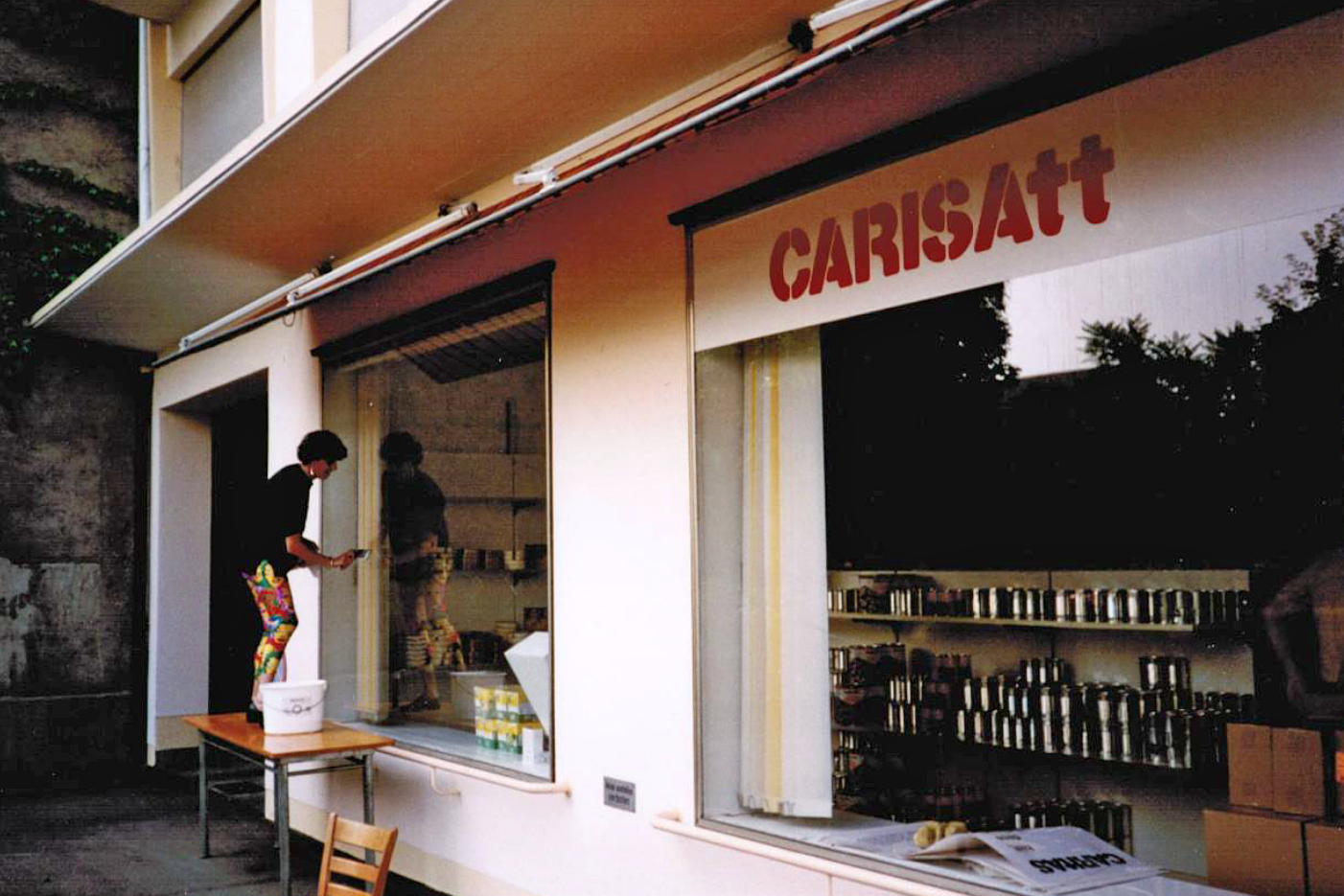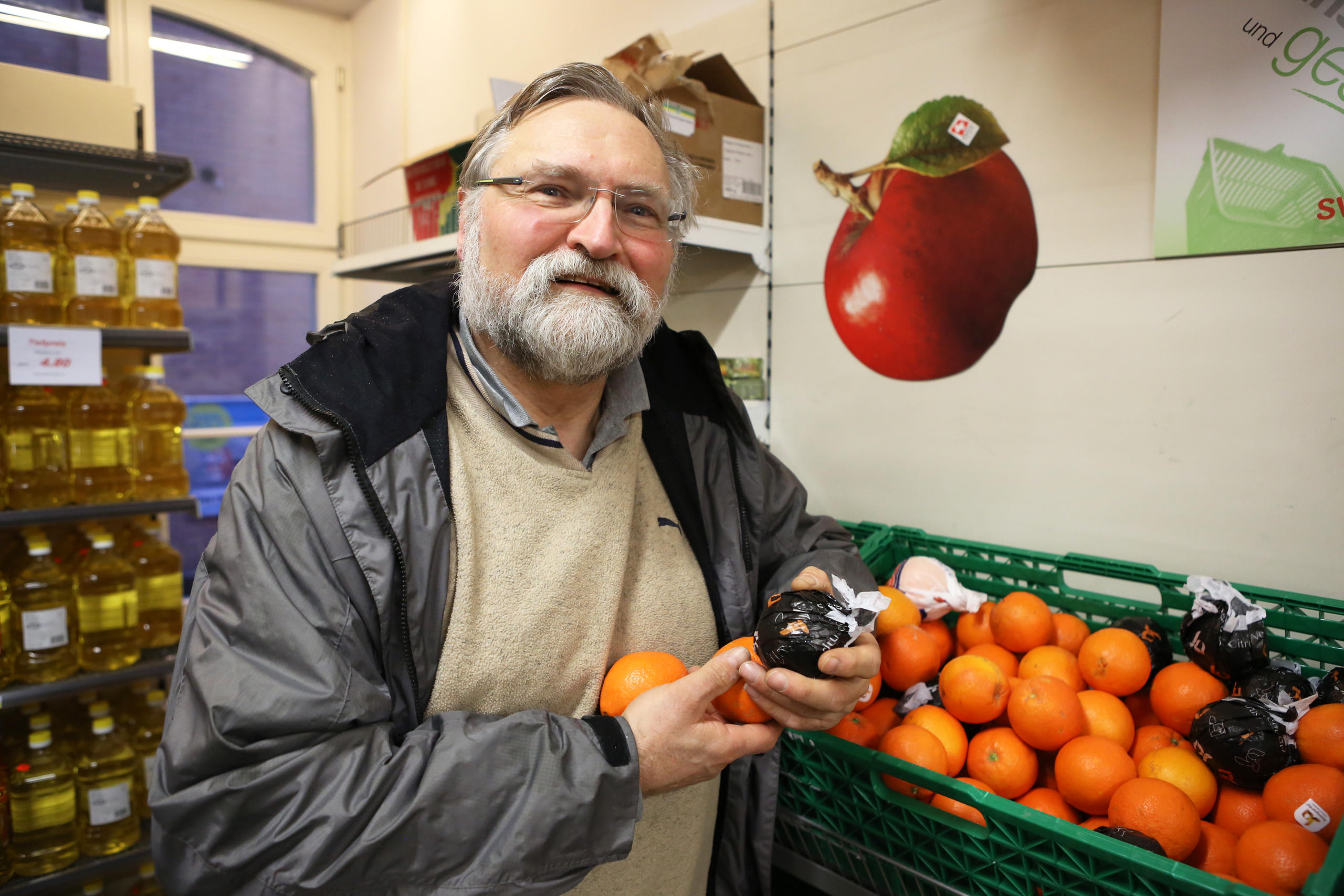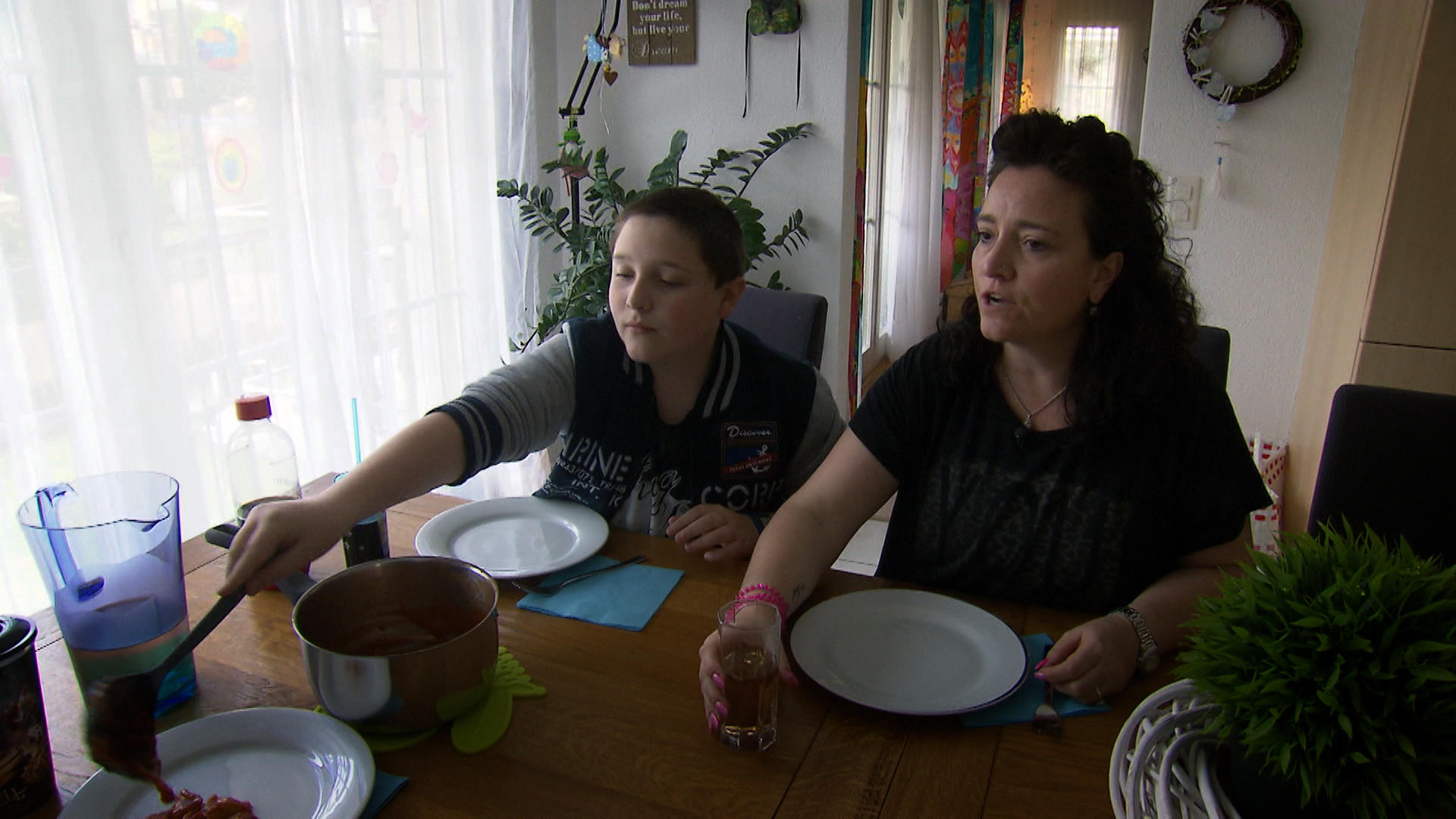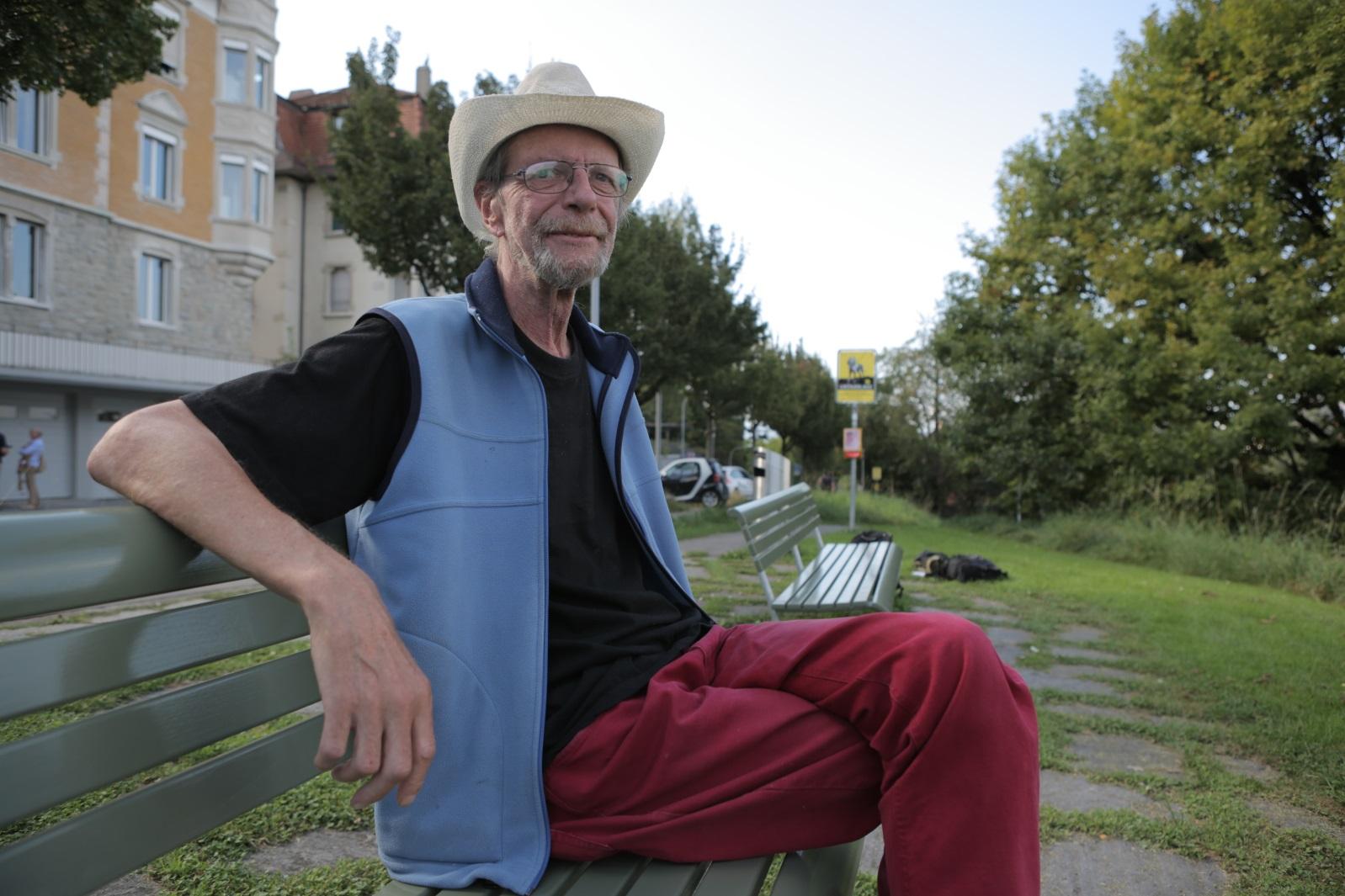Shops for the poor, a 25-year ‘scandal’

How did a charitable one-stop-shop become an indispensable support for thousands of poor people in rich Switzerland? Christoph Bossart, co-founder of the first “scandalous” Caritas store, explains why it divided public opinion.
“Look! Something’s remained!” Bossart is pointing at a sign on a wall of a building. It shows the name of Switzerland’s first food shop aimed at poor people, opened in 1992.
“In the beginning it was called Carisatt, after the union Caritas and the German word ‘satt’ which means ‘sated’. But not everyone got the wordplay and today we simply say Caritas,” he tells swissinfo.ch.

We’re in Kleinbasel, part of Basel’s old town next to the River Rhine. This working-class area, with a large foreign presence, is one of the most lively in the city, with all sorts of restaurants, bars and shops. One inconspicuous shop has prices which are half that of retail businesses.
It’s the Caritas shop, which has changed a fair bit since it opened 25 years ago. The range of stock has grown and the shelves now have a bit of everything, from fresh fruit to perfume.
But the goal remains the same: “to make life easier for people on a limited budget so they can go shopping and not spend too much. With the money they save, they can afford a new pair of shoes or a cinema ticket. It’s a way to be a part of society,” Bossart explains.
New form of poverty
Bossart, now retired, worked for the Catholic charity for more than two decades and was one of the founders of the first Caritas shop.
“Already back then there were people who were destitute because they didn’t have a job or were ill,” he says, explaining how a new form of poverty emerged at the turn of the 1990s.

“More and more people were finding themselves unable to guarantee enough food for themselves, despite having a job. There were also the long-time unemployed, single mothers and generally people with a low level of education.”
An official report at the time found around 20,000 people in canton Basel City were threatened by this new poverty – one in ten. The report caused a sensation.
Food banks
How could these people be helped? The solution appeared in a church newspaper article. “It talked of a ‘food bank’ in France, a system of retrieving excess food and redistributing it through a charity to those in need,” says Bossart, who travelled to Paris to see how the food bank worked.
But he realised that the French system couldn’t be exported as it was to Switzerland.
“It was essentially based on voluntary work – a concept that in Switzerland, and more specifically in German-speaking cantons, wasn’t widespread at all.”
In addition, handing things out for free or at symbolic prices, a special characteristic of food banks, didn’t correspond with the philosophy of Caritas’ Basel branch.
“It wasn’t our aim to give people presents. We wanted to give people the chance to choose and to buy things at affordable prices. We didn’t want customers to beg for charity, but to be able to assume responsibility,” he says.
Chocolate mistake
Back in Switzerland, Bossart contacted local food producers and wholesalers.
“The aim was to receive, for free or at giveaway prices, goods that hadn’t been sold but which were perfectly edible. This suited the producers because they didn’t have to pay to get rid of what was left over,” he says. “The large wholesalers, on the other hand, were hesitant. They feared losing some of their customers and wanted to keep control of the quality of their products.”
As a result, Caritas’s Basel office started taking delivery of wrongly labelled products, dented tins, production errors or wares that were near their expiry date or no longer stocked.
In the beginning Bossart himself would drive around in his van, picking up crates of bananas or sweets.
“We once got some quality chocolate from a well-known Swiss chocolate maker. They had released a new brand onto the market but it hadn’t gone down well with consumers. Thanks to this production error, we were able to offer it to poor people,” he says.
Meeting place
The launch of Caritas’s first store, on July 1, 1992, did not go unnoticed, Bossart remembers.
“In Switzerland, and elsewhere, it generated wide media coverage. Some papers wrote that the existence of a shop for poor people in a rich country like Switzerland was a scandal.”
Public opinion was divided, he adds. “Some people criticised the decision to feed poor people rejects,” says Bossart, for whom the store is more than just a local shop.
“It’s also a meeting place where you can get advice and support. But above all it gives a face to poverty.”
More and more people in a difficult situation have sought it out. “At first the focus was on Swiss people, but it soon shifted to migrants and refugees from the former Yugoslavia,” he says.
Within a short period of time, what had been launched as a simple pilot project had expanded and already by 1994 similar stores had opened in Lucerne, St Gallen and Bern.
Thanks to an agreement with a large transport firm, and constant professionalisation – they now have a central cooperative that dealt with logistics – their network of shops extends across the entire country. According to the cantons, the 24 sales outlets employ part-time workers, those with no job and volunteers.

More
Where the poor go shopping
‘Bad news’
In 2015, the Caritas shops recorded total turnover of more than CHF13 million ($13.1 million). In one year, the shops sold 1.3 million litres of milk, 140,000 kilos of flour and 240,000 kilos of sugar.
Despite the increasing success, Bossart says he’s not satisfied. Now that he no longer has to look after the books of the Basel shop, he sees the development from a different perspective.
“The increase in the number of shops and sales is bad news,” he says. “It would be better if there were no need for them.”
He notes that the appearance of new “hard discount” chains is a good thing. “We should welcome cheap offers if they help people in need.”
Poverty statistics
Around 530,000 people in Switzerland – 6.6% of the population – have an income which is below the poverty line, according to Caritas. The Swiss Conference for Social Welfare puts the poverty line at CHF2,600 ($2,615) for an individual and CHF4,900 for a family of four (2015 figures). There are also around 500,000 people who are in a financially precarious situation, which places them at risk of poverty.
The groups most at risk are the unemployed and people in training, workers with low salaries (the working poor), families with more than two children and single-parent families. In Switzerland one single-parent family in seven lives in poverty.
A recent Federal Statistical Office report found that poverty affected 73,000 children, or one in 20.
Translated from Italian by Thomas Stephens

In compliance with the JTI standards
More: SWI swissinfo.ch certified by the Journalism Trust Initiative












You can find an overview of ongoing debates with our journalists here . Please join us!
If you want to start a conversation about a topic raised in this article or want to report factual errors, email us at english@swissinfo.ch.